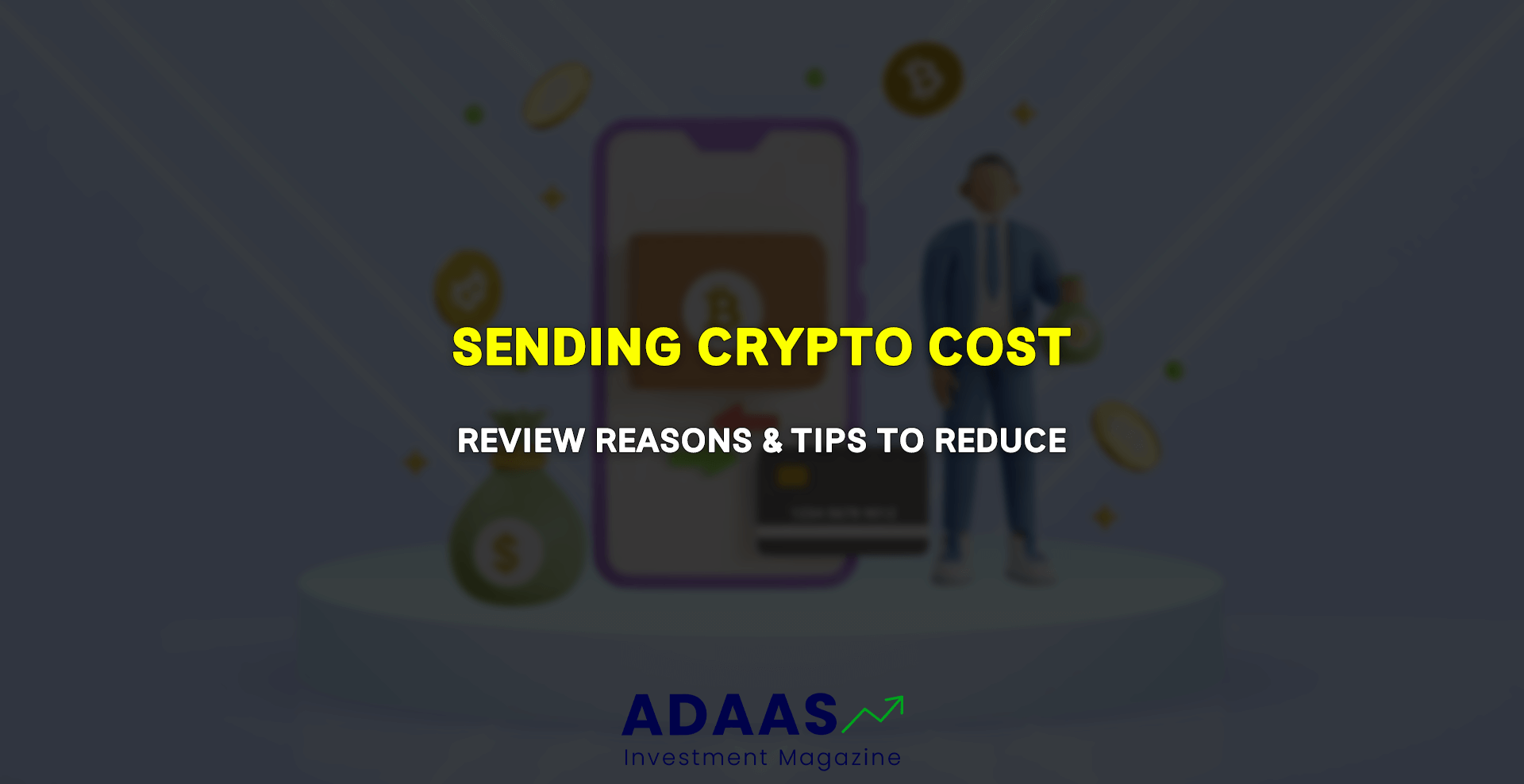Does It Cost Money To Send Crypto To Other Wallets Online?
Discover the ins and outs of transaction costs in the world of cryptocurrencies and learn how to optimize your transfers.
By reading the article “The Cost Of Sending Crypto” published in Adaas Investment Magazine, you will be fully familiar with the reasons for the existence of fees in cryptocurrency transactions besides some tips to reduce your crypto transactions’ fees! This level of familiarity can be enough when you need educational information about this topic.
This podcast is published for you!
Cryptocurrencies have taken the financial world by storm, offering a digital alternative to traditional forms of currency. Operating on decentralized networks called blockchains, cryptocurrencies enable secure and transparent transactions. To participate in this digital revolution, users rely on Cryptocurrency wallets that allow them to send, receive, and store their cryptocurrencies. In this blog post, we delve into the intriguing question: Does it cost money to send crypto to other wallets online? We will explore the costs associated with cryptocurrency transactions, uncover factors that affect transaction fees, highlight common transaction fees for popular cryptocurrencies, and provide practical tips on reducing transaction costs.
Cryptocurrencies are digital or virtual currencies that utilize cryptographic technology for secure transactions. Unlike traditional fiat currencies issued by central banks, cryptocurrencies are decentralized and operate independently of any government authority. Popular cryptocurrencies like Bitcoin, Ethereum, and Litecoin have gained widespread recognition and adoption.
Digital wallets, also known as cryptocurrency wallets, are software applications that enable users to securely store and manage their cryptocurrencies. These wallets generate unique addresses for each user, allowing them to send and receive cryptocurrencies. Wallets come in various forms, including online wallets, hardware wallets, and mobile wallets, each offering different levels of convenience and security.
The primary purpose of this article is to shed light on the costs associated with sending cryptocurrencies to other wallets online. Many cryptocurrency newcomers and enthusiasts wonder whether there are fees involved in these transactions and what factors influence the costs. By providing insights into transaction fees and factors affecting them, we aim to equip readers with the knowledge they need to make informed decisions and optimize their cryptocurrency transactions.
Let’s dive in and unravel the fascinating world of cryptocurrency transaction costs!
Table of Contents
Understanding Cryptocurrency Transactions
Cryptocurrency transactions form the backbone of the digital currency ecosystem. To comprehend the costs associated with sending cryptocurrencies to other wallets, it’s crucial to grasp how these transactions work within the blockchain. Let’s break it down step by step:
How Transactions Work in the Blockchain
Digital Signatures: When you initiate a cryptocurrency transaction, your wallet creates a digital signature, a unique cryptographic code that serves as proof of your ownership and authorization.
Broadcasting to the Network: Once your transaction is signed, it is broadcasted to the network of nodes (computers) that maintain the blockchain. These nodes verify the validity of your transaction.
Verification and Inclusion in a Block: Miners, the unsung heroes of the blockchain, play a crucial role in verifying and processing transactions. They dedicate computational power to solve complex mathematical problems and add new blocks to the blockchain. When a miner successfully solves the problem, they validate and include your transaction in a block.
The Role of Miners and Transaction Fees
Miners are incentivized to process and validate transactions through two primary mechanisms: block rewards and transaction fees.
Block Rewards: When miners successfully add a new block to the blockchain, they are rewarded with a certain amount of newly minted cryptocurrencies. This acts as an incentive for miners to continue securing the network and processing transactions.
Transaction Fees: In addition to block rewards, miners also receive transaction fees paid by users. These fees serve as an additional incentive for miners to prioritize and include transactions in blocks.
Transaction fees ensure that miners prioritize transactions based on the fees attached to them. Transactions with higher fees are more likely to be included in blocks promptly, while transactions with lower fees may experience delays.
Simplified Explanation of Complex Concepts
Understanding blockchain technology and the role of miners can be daunting for newcomers. To simplify these complex concepts:
- Think of the blockchain as a digital ledger that records all cryptocurrency transactions.
- Miners act as the validators and auditors of these transactions, ensuring their accuracy and security.
- Transaction fees are like a “tip” you pay to miners to prioritize and process your transaction promptly.
By demystifying these complex concepts in simple terms, we hope to make the world of cryptocurrency transactions more accessible and understandable for all.
Stay tuned as we explore the factors that affect transaction costs and delve into the common transaction fees for popular cryptocurrencies in the next sections. Understanding these factors will help you navigate the world of cryptocurrency transactions with confidence and make informed decisions about sending crypto to other wallets online.
Factors Affecting Transaction Costs
When it comes to sending cryptocurrencies to other wallets online, several factors come into play that can influence the costs associated with these transactions. Understanding these factors is essential for managing transaction fees effectively. Let’s explore them in detail:
Network Congestion and its Impact on Fees
Increased Demand: Cryptocurrency networks experience fluctuations in activity levels, with peak times leading to higher transaction volumes. During these periods of high demand, known as network congestion, transaction fees tend to rise due to limited block space.
Delays and Higher Costs: Network congestion can result in delays in transaction confirmations, as miners prioritize transactions with higher fees. Consequently, to ensure prompt processing, users may need to attach higher transaction fees, leading to increased costs.
Wallet Providers and their Fee Structures
Varying Fee Policies: Different wallet providers have their fee structures in place, which can impact the costs of sending crypto to other wallets. Some wallets charge a fixed fee per transaction, while others calculate fees based on factors such as transaction size or priority.
Wallet Features vs. Fees: It’s important to consider the trade-off between wallet features, security, and the associated fees. Wallets offering advanced features and enhanced security may charge higher fees, while simpler wallets may have lower fees but fewer functionalities.
Cryptocurrency Type and its Effect on Transaction Costs
Blockchain Design: Each cryptocurrency operates on its own blockchain, which affects transaction costs. Factors such as block size, block confirmation times, and mining algorithms impact the efficiency and cost of transactions.
Examples:
- Bitcoin (BTC): Bitcoin’s limited block size and high demand have led to increased transaction fees during peak times.
- Ethereum (ETH): Ethereum’s popularity and usage have also resulted in network congestion and rising transaction fees.
- Litecoin (LTC): Litecoin, designed to be faster and more scalable, generally offers lower transaction fees compared to Bitcoin and Ethereum.
Understanding how network congestion, wallet providers, and cryptocurrency types can influence transaction costs will enable you to make informed decisions when sending cryptocurrencies to other wallets online. In the next section, we will explore the common transaction fees for popular cryptocurrencies, providing you with accurate fee estimates based on recent data.
Stay tuned to discover how much it typically costs to send popular cryptocurrencies like Bitcoin, Ethereum, and Litecoin, and learn valuable strategies to reduce transaction costs effectively.
Common Transaction Fees for Popular Cryptocurrencies
Transaction fees play a significant role in determining the cost of sending cryptocurrencies to other wallets online. The fees associated with each transaction are influenced by various factors, including network congestion, blockchain design, and individual wallet providers. Let’s take a closer look at the common transaction fees for some of the most popular cryptocurrencies:
Bitcoin Transaction Fees
Bitcoin, being the pioneer of cryptocurrencies, has seen a surge in popularity, resulting in increased transaction fees. The fees for Bitcoin transactions depend on several factors, including network congestion and the priority level set by users. Recent data suggests the following fee estimates for Bitcoin transactions:
Ethereum, known for its smart contract capabilities and diverse ecosystem, has also experienced network congestion and rising transaction fees. The fees for Ethereum transactions can vary significantly based on network activity and the complexity of the transaction. Recent data indicates the following fee estimates for Ethereum transactions:
It’s important to note that transaction fees can vary over time due to network conditions and other factors. To get the most accurate fee estimates, it’s advisable to check real-time data from reliable sources or consult your wallet provider.
By understanding the common transaction fees for popular cryptocurrencies like Bitcoin, Ethereum, and Litecoin, you can plan and budget your cryptocurrency transactions more effectively. In the next section, we will explore strategies to reduce transaction costs and optimize your crypto transfers.
Stay tuned to discover practical tips on how to lower transaction costs and make the most of your cryptocurrency transactions.
Wanna know about low-cost cryptocurrencies? Click Here!
Reducing Transaction Costs
When it comes to sending cryptocurrencies to other wallets online, minimizing transaction costs is a key concern for users. Fortunately, there are several strategies you can employ to reduce these costs and optimize your crypto transfers. Let’s explore some practical tips:
Timing Transactions During Low Network Congestion
Off-Peak Times: Take advantage of periods when cryptocurrency networks experience lower activity levels. During these off-peak times, network congestion is typically reduced, leading to lower transaction fees. Consider scheduling your transactions during these quieter periods to save on costs.
Monitor Network Activity: Stay informed about network congestion by keeping an eye on blockchain explorers or specialized websites that provide real-time data on transaction fees. By monitoring network activity, you can identify optimal times to initiate your transactions with lower fees.
Choosing a Wallet Provider with Lower Fees
Compare Fee Structures: Different wallet providers have varying fee structures. Before selecting a wallet, compare the fees charged for transactions. Look for wallets that offer competitive rates and align with your budget and transaction needs.
Consider Fee Customization: Some wallet providers allow users to customize transaction fees based on priority. This feature enables you to adjust the fee amount to suit your desired transaction speed and cost efficiency.
Utilizing Cryptocurrencies with Lower Transaction Fees
Explore Alternatives: Consider utilizing alternative cryptocurrencies that offer lower transaction fees compared to popular options like Bitcoin and Ethereum. Look for cryptocurrencies that prioritize scalability and low-cost transactions.
Research Transaction Fees: Before engaging in transactions with a specific cryptocurrency, research and compare the transaction fees associated with different coins. This information will help you make informed decisions about which cryptocurrencies to use for cost-effective transfers.
Evaluate Use Case: Depending on your specific use case, certain cryptocurrencies may offer more cost-effective solutions. For example, if you need fast and low-cost transfers for everyday transactions, BNB or TRX might be suitable options.
By employing these strategies, you can significantly reduce transaction costs and make your cryptocurrency transfers more cost-effective. However, it’s essential to strike a balance between cost and other factors such as security, speed, and usability.
Remember, transaction fees can vary based on network conditions and individual wallet providers, so staying informed and comparing options regularly is crucial.
Stay tuned to wrap up our exploration of the costs associated with sending crypto to other wallets online!
Conclusion
In this blog post, we have explored the costs associated with sending cryptocurrencies to other wallets online. Let’s recap the key points discussed:
Understanding Cryptocurrency Transactions: We delved into how transactions work in the blockchain, emphasizing the role of miners and transaction fees. By simplifying complex concepts, we made the world of cryptocurrency transactions more accessible.
Factors Affecting Transaction Costs: We examined the influence of network congestion, wallet providers, and cryptocurrency types on transaction fees. These factors play a crucial role in determining the costs associated with sending crypto to other wallets.
Common Transaction Fees for Popular Cryptocurrencies: We provided fee estimates for Bitcoin, Ethereum, and Litecoin transactions based on recent data. These estimates can help you plan and budget your cryptocurrency transfers effectively.
Reducing Transaction Costs: We discussed practical strategies to lower transaction fees, including timing transactions during low network congestion, choosing wallet providers with lower fees, and utilizing cryptocurrencies with lower transaction fees.
As you embark on your cryptocurrency journey, it’s essential to research and compare fees before making transactions. Here are some important considerations:
- Stay Informed: Keep up to date with real-time data on transaction fees through blockchain explorers or specialized websites. This information will help you make informed decisions about the optimal timing for your transactions.
- Compare Wallet Providers: Take the time to compare wallet providers and their fee structures. Look for wallets that offer competitive rates while aligning with your transaction needs and security requirements.
- Explore Alternative Cryptocurrencies: Consider exploring alternative cryptocurrencies that offer lower transaction fees. Research and compare the fees associated with different coins to find the most cost-effective options for your transfers.
In conclusion, understanding and managing transaction costs is crucial for navigating the world of cryptocurrencies. By employing the strategies discussed in this blog post, you can optimize your crypto transfers and reduce unnecessary expenses.
We encourage you to continue learning about cryptocurrencies and exploring different wallet providers. Take the initiative to research, compare, and make informed decisions that align with your financial goals.
Are you ready to dive deeper into the exciting realm of cryptocurrencies and wallet providers? Start your journey today by exploring reputable resources, staying updated on the latest developments, and engaging with the vibrant cryptocurrency community.
Happy transferring and may your cryptocurrency transactions be both efficient and cost-effective!

The End Words
At Adaas Capital, we hope that by reading this article you will be fully immersed in The Cost Of Sending Crypto! You can help us improve by sharing this post which is published in Adaas Investment Magazine and help optimize it by submitting your comments.
FAQ
Is sending crypto to another wallet free?
No, sending crypto to another wallet is not free. There is usually a small fee associated with sending crypto, called a “gas fee”. The gas fee is used to pay the miners who process the transaction and add it to the blockchain. The amount of the gas fee varies depending on the network and the amount of traffic on the network. In general, the higher the traffic on the network, the higher the gas fee.
Can I send crypto to someone else’s wallet?
Yes, you can send crypto to someone else’s wallet. To do this, you will need to know the recipient’s wallet address. You can find the recipient’s wallet address by asking them or by looking it up on a blockchain explorer. Once you have the recipient’s wallet address, you can send crypto to them by following these steps:
1- Open your crypto wallet.
2- Click on the “Send” button.
3- Enter the recipient’s wallet address.
4- Enter the amount of crypto you want to send.
5- Click on the “Send” button.
The crypto will be sent to the recipient’s wallet address and they will be able to access it once the transaction has been confirmed.
How do I avoid fees when sending crypto?
Here are some tips on how to avoid fees when sending crypto:
Choose a time when the network is less congested. The network is typically less congested during off-peak hours, such as early in the morning or late at night.
Send a smaller amount of crypto. The fee is typically lower for smaller transactions.
Use a different network that has lower fees. Some networks, such as the Lightning Network, have lower fees than others.
Use a wallet that allows you to set your own fee. Some wallets allow you to set your own fee, which can help you save money.
Wait for the transaction to confirm. You can often save money by waiting for the transaction to confirm before sending it.
Why are there fees for transferring crypto?
Crypto transactions are processed by miners, who are rewarded with a small amount of crypto for their work. The fees help to incentivize miners to process transactions and add them to the blockchain.
The amount of the fee varies depending on the network and the amount of traffic on the network. In general, the higher the traffic on the network, the higher the fee.





